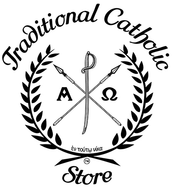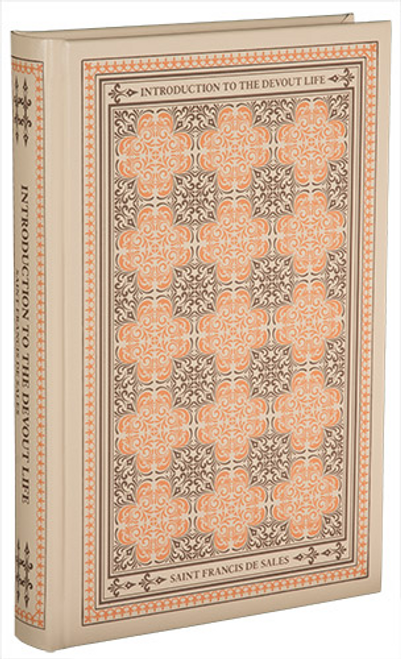Self –abandonment, is itself the work of God: While he strips of everything the souls who give themselves absolutely to him, God gives them something which takes the place of all; of light, wisdom, life and force: this gift is his love
Fr. Caussade’s Self Abandonment to Divine Providence is a book for all those who in the words of St. Benedict, “Truly seek God”. Fr. Caussades’s spiritual teaching was derived from two extremely pure sources, St. Francis de Sales and St. John of the Cross. Another source of influence on Caussade were his penitents, the Nuns of the Visitation.
Fr. Caussade effectively synthesizes both Salesian and Carmelite traditions in this book, which is comprised of his letters and dialogues on prayer. Fr. Caussade refers to the Salesian teaching of self-abandonment and simplicity, and the Carmelite emphasis on grace as a dynamic force that enlightens and cleanses the soul. When speaking of death to self, he refers to “abandonment” “trust” and “acquiescence”. He impresses upon the reader, that abandonment may be taught and practiced by repeated acts. It is the duty of every Christian to acquire this virtue.
Yet since he is still an unknown figure to many Englishmen; since to some who read widely he is bound to challenge comparison with others; since, in fine, despite his discursive exterior he has a clearly defined doctrine for us to learn, there seems room for a word of introduction which endeavours to give, in his own words, the main lines of his teaching, and to indicate what masters he himself appears to have been willing to follow.
I. Very little is known of the life of Caussade, and since Abbot Chapman has recently set out this little in the article referred to above (which also appeared as an introduction to Caussade’s Dialogues on Prayer), we may pass at once to consider his spiritual teaching. It has come down to us in three books: L’Abandon; the above-mentioned treatise in the form of dialogues on prayer; and a considerable number of letters to a small group of correspondents, almost all religious of the Visitation. With the two last books we are not here concerned, and, although they throw very valuable light on Caussade’s mind, they do not add in any essentials to the teaching of L’Abandon, which, as in form it is undoubtedly his masterpiece, so in matter is the very kernel of his doctrine.
Père de Caussade’s spiritual teaching was derived from two extremely pure sources, S. Francis de Sales and S. John of the Cross, and his great and distinctive achievement, unless I am mistaken, is to have made a synthesis of the Carmelite and Salesian traditions. That he should be beholden to S. Francis was only to have been expected. Bremond has shown us how deep was S. Francis’ influence on French religious thought in the century that followed his death, and Caussade received this influence from at least two different directions. We know from his own words how great was the influence of Bossuet upon him. Bossuet, though by no means wholly Salesian, knew S. Francis well and took from him a number of leading ideas. Several of these, and above all abandonment to Divine Providence and confidence in God, are precisely those which most attract Caussade. But another source of influence was probably still more potent. Caussade, like all directors, must have learnt much from his penitents, and these were, for the most part, nuns of the Visitation. He would naturally wish to express himself in an idiom with which they were familiar and steep himself in the writings of their lawgiver, and we are not surprised to find many traces of resemblance, both doctrinal and verbal, between him and S. Francis. Indeed, the two phrases which recur most frequently in his treatises and letters—abandonment to Divine Providence and the value of the present moment—are peculiarly Salesian, and it is noteworthy that whereas the Carmelite school, following S. Teresa and S. John, when speaking of the death to self use by choice the evangelical words ‘poverty,’ ‘renunciation’ and ‘death,’ Caussade instinctively turns to ‘abandonment,’ ‘trust’ and ‘acquiescence.’ Yet in speaking of Salesian influence we must make a distinction. The mode of expression, as is well known, if not the whole method, of S. Francis underwent a remarkable development as the result of his experience with the Visitation at Anneçy, and in particular with the way of impotence and desolation by which S. Jane Frances was led. The deepest and most intimate chapters of the Love of God are of an entirely different colour—one had almost said, of an entirely different culture—from the Introduction, the early letters and even some of the Conferences. It is to this later period, the Visitandine, Chantal period, that Caussade is related, and the tone of L’Abandon is in many places almost precisely that of the deepest chapters of the Love of God.
The second great source of Caussade’s doctrine is the school of Carmel, and especially S. John of the Cross. During his maturity the long-dormant interest of the Church as a whole had been reawakened by S. John’s canonization in 1726. In Spain a serious attempt was made to print a critical edition of his works, and in any case his doctrine was now placed beyond the breath of calumny. There are specific references to him in the dialogues on prayer, but one does not get the impression that Caussade used him as a guiding text-book, and I am not aware that Caussade was thrown often into direct contact with Carmelites. Nevertheless, his mystical theology, as we shall see, squares exactly with the scheme set out in the Ascent and the Dark Night and treated as classic by the Carmelite theologians. This agreement is all the more remarkable because it is implicit rather than explicit. Caussade does not, of preference, throw the same aspects or moments of the spiritual life into high light; his compositions are not in the same key as S. John’s; he has not that peculiar Carmelite family likeness which Anne of Jesus, let us say, shares both with S. John and with S. Teresa of Lisieux. Yet I think there can be no doubt that his doctrine, as formulated in L’Abandon, can be equated with S. John’s far more fully than can S. Francis’ or Père Grou’s. Perhaps equation is not the best term; I have already suggested that Caussade’s achievement is one of synthesis. He, and he alone of the great French spiritual writers, superimposes on the Salesian teaching of self-abandonment and simplicity the typically Carmelite emphasis on grace as a dynamic force, enlightening and cleansing the soul.
We look, and, so far as I am aware, we look in vain, for another source of influence on Caussade. Within his own Society, and in France, there had been a succession of eminent directors who drew their inspiration from the great Lallemant. Caussade cannot, one would think, have been unaware of this tradition or unsympathetic to it. His outlook is, in fact, very close to that of the Lallemant school, and not at all close to that of Rodriguez and Bourdaloue. Yet so far as I have noticed he makes no direct reference to them; certainly there is in L’Abandon no trace of emphasis on the points so dear to Lallemant himself—the sharp opposition of active and contemplative, the exposition of the gifts of the Holy Ghost, the insistence on the need for a ‘second conversion.’
We may now look a little more closely at the leading ideas of Caussade’s teaching, and the whole system into which they fit. Chief amongst them is, of course, the one which gives its title to the present treatise—the word Caussade has made peculiarly his own—L’Abandon. The translator has decided to render this by the compound English word ‘self-abandonment.’ This is probably as near as our language can get to the French word, but his readers must ultimately learn from Caussade’s whole body of teaching the lull meaning of the term. For the moment, it is important to remember that ‘self-abandonment’ does not for him directly signify the active, ascetic renunciation of self, self-love and self-will. This process, rightly emphasized by all ascetical writers and occupying a very large place in Carmelite spirituality, occupies a relatively minor place in Caussade’s thought, not because he neglects, but because he assumes it. His ‘self-abandonment’ is, in its primary sense, an acceptance of the Will of God, a submission to it. On the second page of the book our Lady’s Fiat mihi is given us as our exemplar. But the meaning of the word, as his doctrine develops, deepens still further. Two common uses of the word in English may help us to an appreciation. We speak of a swimmer abandoning himself to the waves or to the current. He may or may not wish to swim against, across or with them; in any case he finds that his independent efforts are useless or needless, and he abandons himself to the waters. We speak of one abandoning himself to grief. From this motive or that, by distraction or compulsion, with hope of success or without it, he has kept grief from mastering him. He now opens his heart to it and becomes all grief. It masters him and yet it is what his heart desires. If we substitute the divine action for the waters of the sea or of sorrow in these two phrases, we shall have a faint, inaccurate conception of the deepest meaning of Caussade’s ‘self-abandonment’—inaccurate because in the case of co-operation with grace the human liberty and, at least normally, the human effort is still, and must be, present.
But let us return to the root meaning of ‘self-abandonment.’ Acceptance of the Will of God, whether signified to us by command, counsel and inspiration, or manifested by the ordinations of Divine Providence, is the duty of every Christian. It is a virtue; it may be taught and practised by repeated acts. But ‘self-abandonment’ in Caussade’s vocabulary means something more. It means the real, effective gift to God of all the powers of the soul. It means the attitude, the outlook of a soul so given. It means the state of a soul caught up, so to say, in God’s machinery, for whom the supernatural life is more real than the natural. Vivo ego, jam non ego. Caussade’s first editor, the saintly Père Ramière, S.J., tells us that the treatise, as he printed it, is a mixture of letters and conferences taken down by one of the audience. The order and divisions which we now have are Ramière’s, not Caussade’s. His aim was to divide matter which would be useful to all souls from that which would primarily be of use only to advanced souls. In the first division he tried to collect instructions for acquiring the virtue of abandonment; in the second, advice for those who were in the state of abandonment. This division serves its purpose to some extent, but it does not really correspond to any development in Caussade’s thought. In his Letters, indeed, we see how he speaks to beginners and those not in religion, but L’Abandon is addressed in its entirety to souls of whom he is certain—chosen souls, contemplatives. Consequently, it is impossible to isolate any single utterance and to say of it that it is not mystical. It does not seem that anything is to be gained here by minimizing the truth.
David Knowles
1933







